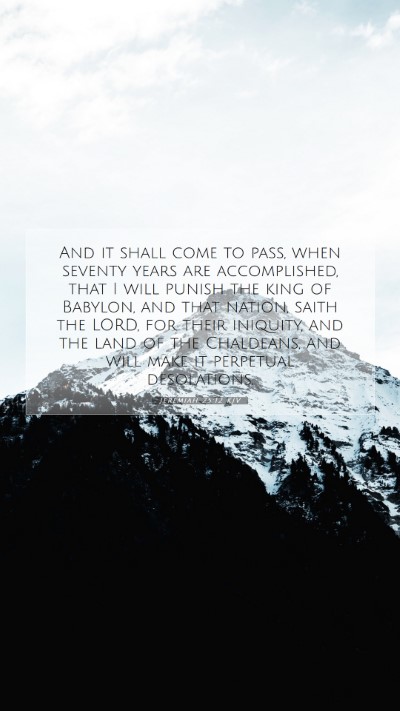Bible Verse Commentary on Jeremiah 25:12
Jeremiah 25:12 (KJV): "And it shall come to pass, when seventy years are accomplished, that I will punish the king of Babylon, and that nation, saith the Lord, for their iniquity, and the land of the Chaldeans, and will make it perpetual desolations."
General Overview
Jeremiah 25:12 encapsulates a weighty proclamation from God concerning the future fate of Babylon in relation to the Jewish people and their upcoming period of exile. This verse serves as a critical point of prophecy, establishing a timeline of seventy years for the exile and subsequent divine judgment against Babylon for its wrongdoings.
Contextual Analysis
This verse is situated in a larger narrative where God, through the prophet Jeremiah, articulates both judgment and hope. The seventy years of exile were a direct result of Israel's disobedience, as their idolatry and sins compelled God to allow Babylon, an enemy nation, to capture them.
- Seventy Years: This indicates a predetermined period of punishment and divine orchestration regarding Israel’s suffering (see Jeremiah 29:10).
- Judgment on Babylon: The ending of this period would see God turning His wrath against Babylon for their part in Israel's oppression and their own sinful actions.
Commentary Insights
Matthew Henry's Commentary
Matthew Henry emphasizes God's sovereignty in both punishment and restoration. He notes that God's judgment on Babylon not only serves as retribution but is also a reminder of His faithfulness in bringing Israel back to their land.
Albert Barnes' Notes
Barnes points out that the term "seventy years" aligns with God's established timeline for Israel's return. He interprets the "perpetual desolations" as a promise of complete destruction for Babylon, showcasing God's justice in punishing nations that act against His people.
Adam Clarke's Commentary
Clarke expands on the historical context by highlighting how after these seventy years, Babylon would be overtaken by media and Persian forces, exemplifying the prophetic nature of this declaration. Clarke notes that this speaks to the broader historical movements of nations under divine providence.
Modern Application and Relevance
The themes in Jeremiah 25:12 resonate today, inviting believers to reflect on the consequences of sin and the richness of God’s mercy. It serves as a caution against national and personal disobedience while providing hope for redemption and restoration.
Key Takeaways
- The Nature of God’s Justice: This verse illustrates that God does not overlook sin, affirming His righteousness.
- Hope After Judgment: Despite the prophecy of destruction, the promise of restoration after seventy years instills hope in the heart of believers.
Bible Study Insights
For those engaged in Bible study groups or online Bible study, Jeremiah 25:12 serves as a fundamental verse for exploring themes such as divine discipline, prophetic literature, and God's overarching sovereignty in history.
Recommended Study Practices
- Historical Context Exploration: Understanding the geopolitical climate of Babylon during this prophecy sheds light on the text.
- Cross-Referencing Related Verses: Connecting this verse with Isaiah 47 (the fall of Babylon) and Jeremiah 29:10-14 (the promise of restoration).
Related Bible Cross References
- Isaiah 13:19 - A prophecy concerning the fall of Babylon.
- Jeremiah 29:10-14 - A reassurance of return and restoration after the exile.
- Daniel 9:2 - Reference to the seventy years of exile prophesied.
Conclusion
Jeremiah 25:12 encapsulates significant elements of judgment, prophecy, and hope. This understanding enriches Bible study insights and helps believers grasp the profound implications tied to the history of Israel as well as the broader narrative of God's redemptive plan.


